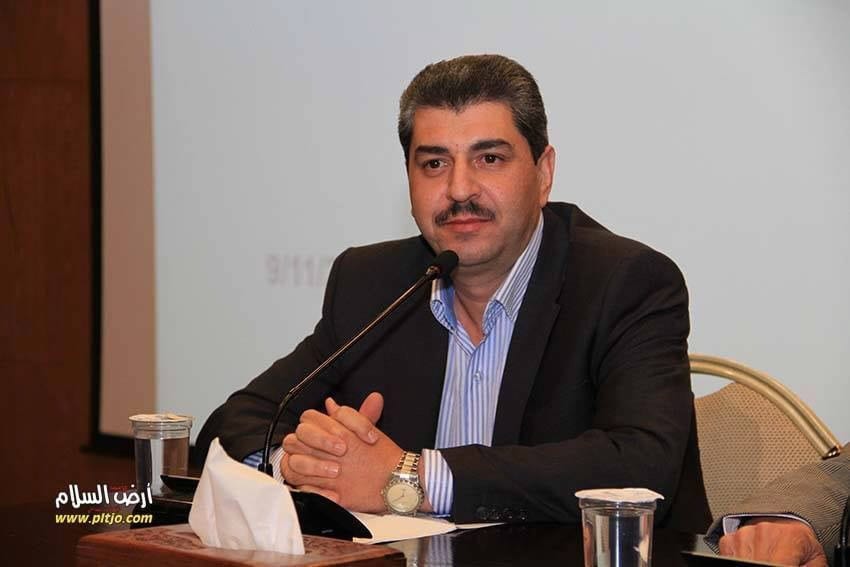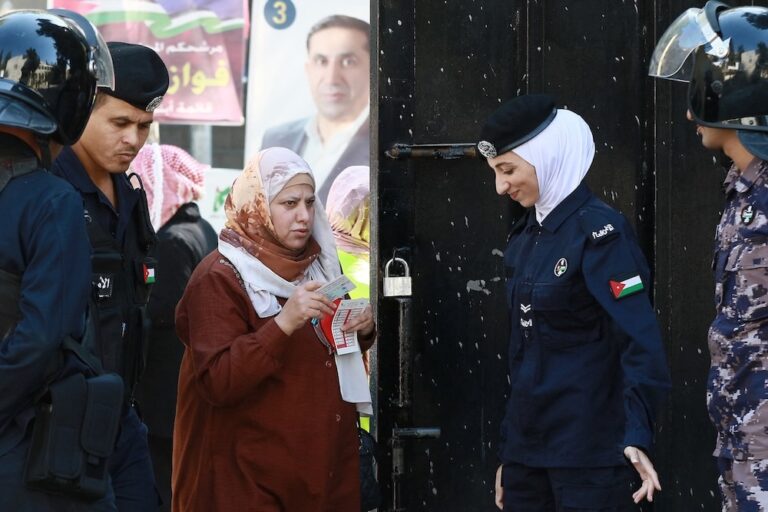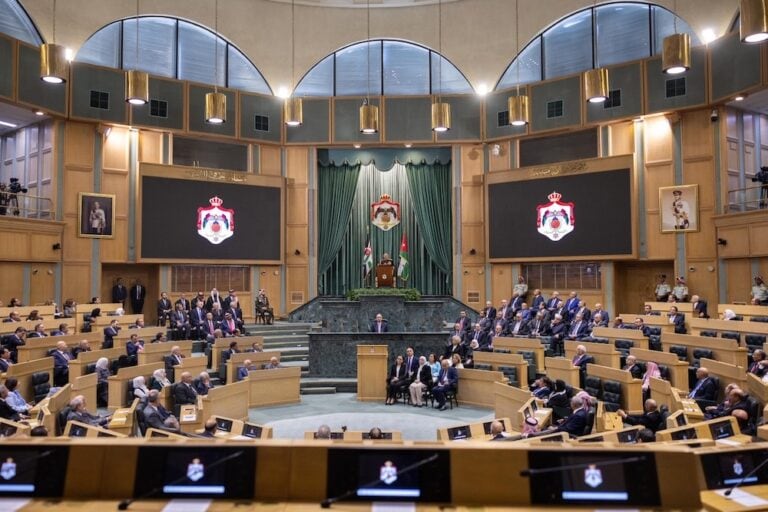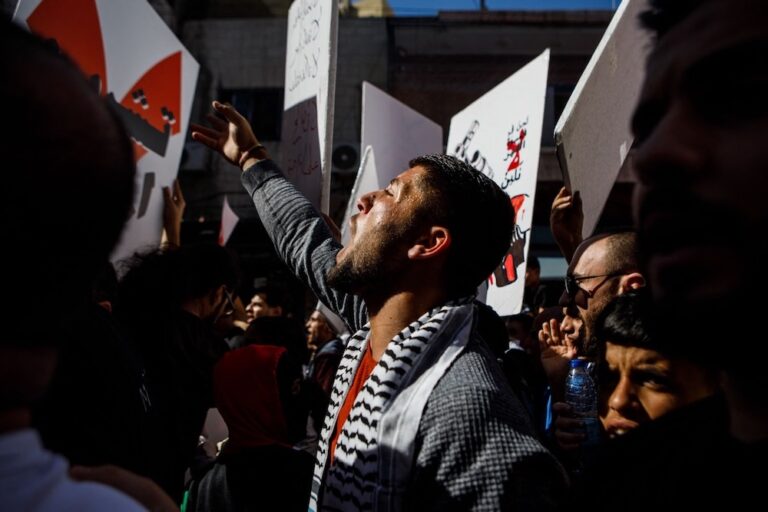Activists demand Al-Zoubi's release, slamming the government's attempt to silence him for his online free expression.
This statement was originally published on gc4hr.org on 8 August 2024.
On 2 July 2024, Jordanian security forces arrested well-known writer and journalist Ahmed Hassan Al-Zoubi while he was with his wife and children on his way to his hometown of Al-Ramtha, in northern Jordan. He was imprisoned to serve a prison sentence issued against him last year.
The Court of First Instance had issued a ruling against him on 22 June 2023, sentencing him to two months in prison and a fine of 50 Jordanian dinars (70 US dollars). This was related to a post he published on his Facebook page in December 2022, during a strike by transport truck drivers in Ma’an Governorate against rising fuel prices, in which he criticised the authorities’ handling of the events that accompanied the strike. Ma’an Governorate is about 218 km from the capital, Amman.
The Public Prosecution appealed the initial ruling in order to increase it. As a result, on 27 July 2023, the Amman First Instance Court, in its capacity as an appeals court, decided to annul his initial sentence of two months in prison, and ordered him to be imprisoned for a full year, in addition to imposing a fine of 50 Jordanian dinars and requiring him to cover the costs of legal procedures.
This ruling came after the court convicted him of allegedly “inciting sectarian and racist strife and inciting conflict between the components of the nation,” according to Article 150 of the Jordanian Penal Code, and in light of Article 15 of the previous Cybercrime Law. Despite the fact that Al-Zoubi’s defence team submitted several requests to overturn the ruling and replace the prison sentence with community service, all of these requests were rejected.
Al-Zoubi, 49 years old, is a journalist, and satirical writer. He was writing for the Gulf press between 2000 and 2006, then became prominent in 2004 when he started writing for the official, state-owned Al-Rai newspaper before being suspended. He is also a playwright who authored several plays, including the famous play “Al’An Fahimtkum” in 2011, and “Bleeding Solo” in 2012. He is also the founder and editor-in-chief of the Sawaleif website, which deals with all important local and international issues and has contributions by several other journalists and writers.
He uses his Facebook page to express his frank opinions on various hot topics going on in the country. On 23 July 2023, he posted the following criticism of the new Cybercrime Law: “The draft cybercrime law will turn us into silent creatures who eat and drink but do not speak.”
He has become one of the most famous Jordanian activists on social media networks, and has become one of the most influential figures in public opinion in the country. He is also known for his critical stances towards the government and senior officials, and his bias towards the poor. He is also known for his constant criticism of some aspects that he considers to be part of political or financial corruption or the exploitation of influence and power.
On 6 July 2024, the Sawaleif website published an open statement signed by Jordanian figures, calling for the release of Al-Zoubi, the acceptance of the appeal request submitted by his defence team, or the replacement of the sentence issued against him with a fine or community service according to the laws in force, stressing that he represents “the conscience and soul of Jordanians through his constant bias towards the interests of the homeland and his clear defense of the right of Jordanians to live in freedom and dignity.”

Social media networks also witnessed the launch of wide solidarity campaigns with Al-Zoubi, and a cartoon by the artist Nasser Al-Jaafari was republished, bearing the slogan “In solidarity with Ahmed Hassan Al-Zoubi”, which he had first published in August 2023, after the initial court ruling against him.
Activists in Jordan launched many hashtags expressing solidarity with Al-Zoubi, including “#Ahmed_Hassan_Al-Zoubi”, “#Release_Ahmed_Hassan_Al-Zoubi”, and “#Freedom_for_Prisoners_of_Conscience”, which topped the hashtag lists in Jordan during the past few days, where participants called for the release of Al-Zoubi and not to not punish him for his political opinions. They also wondered about the secret behind the authorities’ attempt to silence him and keep him away from journalistic work and opinion writing. In addition, criticism was directed against the new Cybercrime Law, which includes severe penalties against those who publish political blogs or express their opinions through electronic platforms on the internet or on social media networks.
On 12 August 2023, the King ratified the new Cybercrime Law, further restricting individuals’ right to freely express their opinions online. The law imposes harsher penalties of imprisonment of no less than three months and fines of up to 32,000 Jordanian dinars (45,115 US dollars). The new law uses language that does not meet the requirements of international law in formulating legal texts with sufficient precision to allow individuals to regulate their behaviour according to its requirements.
Al-Zoubi’s arrest comes in the context of a systematic and ongoing campaign of repression by Jordanian authorities against the right to freedom of expression, the right to form or join associations, and the right to peaceful assembly, using vague and overly broad legal provisions, including the Crime Prevention Law No. 7 of 1954, the Penal Code No. 16 of 1960, and the new Cybercrime Law No. 19 of 2023.
Recommendations
The Gulf Centre for Human Rights (GCHR) calls on the Jordanian authorities to:
- Immediately release the prominent journalist Ahmed Hassan Al-Zoubi without any conditions;
- Respect and not restrict freedom of expression and opinion, and allow internet activists to use cyberspace without restricting their activities, as stipulated in Article 15 of the Jordanian Constitution;
- Respect Jordan’s commitments to international conventions that guarantee freedom of opinion and expression, foremost of which is the Universal Declaration of Human Rights and the International Covenant on Civil and Political Rights; and
- Fulfil their constitutional duties, represented in protecting the civil and human rights of citizens, by amending all repressive laws, including the new Cybercrime Law, and working to protect freedom of expression online and offline.



